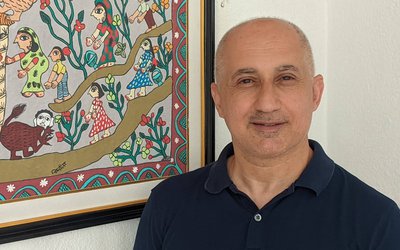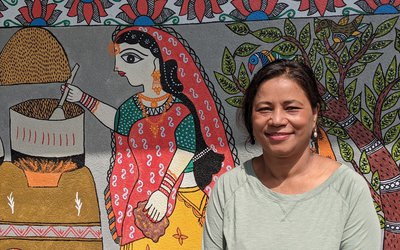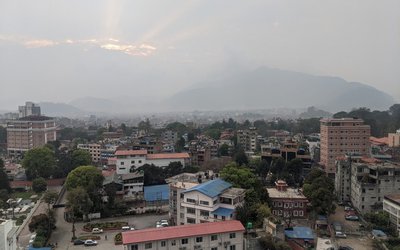
As a Project Manager, how do you look at PRISM’s experience of the last three years?
PRISM has achieved many successes to reduce poverty and improve livelihood of the Informal Waste Workers through various interventions in health, education, access to finance, income generation and integrating waste pickers through its cooperative. IWWs are now healthier, socially respected and capacitated in using recyclable products than three years ago. PRISM project has been able to increase the income of IWWs by 30 percent through waste based small enterprises and knowledge to add value on recycled wastes to get a better price. We have also launched programs to minimize health risk of 4,000 IWWs through basic safety equipment use and safe hygiene practice.
How do you see the initiation of PRISM?
Our initiated social protection schemes like health insurance and formal and non-formal education, saving and credit mobilization have benefitted waste pickers and their family. There has been a reduction in child labor among these people; children of waste pickers have started formal education. Project has also supported waste pickers children below 5 years by initiating ECD centers in different school of Kathmandu Valley. Integrating waste pickers and establishment of a cooperative helped the IWWs to save money and mobilize credit. This scheme supported waste pickers not to go for merchants for money lent at higher interest rates. Establishment of their organization SASAJA is another important achievement. The association helped to protect the interests of waste pickers and enhanced their quality of life, disseminating the message to other people that waste pickers are also equal partners of the society.
How are you managing health care?
Formal agreements with three hospitals in Kathmandu, Lalitpur and Bhaktapur, namely, Korea-Nepal Hospital of Bhaktapur Groups of waste pickers, National Hospital of Patan Groups of waste pickers and Model Hospital for Kathmandu Groups of waste pickers, they are providing yearly health check to these people. IWWs need to pay Rs. 800.00 for health insurance for a year. We have encouraged waste pickers to deposit the money in a fund at their cooperative for the future of their children’s education and health.
What other changes has PRISM brought about?
Due to our intervention, the income of the waste pickers has increased. Our studies have shown that a waste picker earned up to Rs.10, 000.00 compared to Rs. 5000.00 in the past. By providing them with small technologies like rickshaw support, the capacity of waste pickers increased. We supported them to buy tri-cycles for those who went around the city picking garbage from house to house and the streets. We have also provided them training in SIYB (start and Improve your own business) and skill to use the wastes as a resource for living
What about making compost in process?
Compost making enterprise has been established jointly with the community and private sector; two compost plants are in a process to start in Chobhar and Kirtipur in support from Solid Waste Management and Technical Support Centre and Kirtipur Municipality. This is a replication of Pune Model of compost making. Chobhar plant is jointly with a NEPSMAC, a private waste collector and will be technically supported by Solid Waste Management and Technical Support Center (SWMTSC). Another project is in Kirtipur Municipality where local community and waste pickers are involved. The project is supported by Kirtipur Municipality.
What else has PRISM done?
PRISM have done small initiation in waste enterprises and social protection schemes to respect and recognise contribution of informal waste workers in solid waste management which as a result will improve the lives of waste pickers. PRISM is small 3 years piloting project but it is beautiful to informal waste workers “small is always beautiful"
How many waste pickers have benefitted from your program?
Our target was 4,000 but we have identified 7,000 waste workers within the valley Our target to direct intervene was 2,000 but we have already reached up to 2,774. Waste pickers represent in different 59 groups out of which 10 are female groups.
What about safety equipment?
We have provided safety equipment to 5,000 waste workers, which includes municipal waste workers as well.. Direct beneficiaries of our program are 2774 non-formal waste pickers. Project has also capacitated IWWs to use safety gear while working in waste to minimize health risk and live healthier.
What about the cooperatives?
Project has supported to establish waste pickers cooperatives so that the IWWs could sustain their programs ever after the completion of the project. The schemes will continue to run for the long term.
What about the funding?
For the period of 36 months, beginning from 1 June 2011 and ending on 31 May 2014, the total project budget was of Euro 1.5 million EURO. Out of this, 80 percent has been co-funded by the European Union under its investing in People Program and remaining 20 percent has been funded by Practical Action.
Who are implementing partners?
Our implementing partners are Center for Integrated Urban Development CIUD. Proejct have been supported by five municipalities, of Kathmandu Valley. We are also associated with Solid Waste Management and Technical Center and UN Habitat.
- TANAHU HYDROPOWER PROEJCT: A Significant Achievement
- Apr 15, 2024
- AMBASSADOR HANAN GODAR: Sharing Pain With A Nepali Family
- Mar 30, 2024
- VISIT OF KfW AND EIB TO NEPAL : Mission Matters
- Mar 25, 2024
- NEPAL BRITAIN SOCIETY: Pratima Pande's Leadership
- Mar 24, 2024
- NEPAL ARMY DAY: Time To Recall Glory
- Mar 15, 2024
















